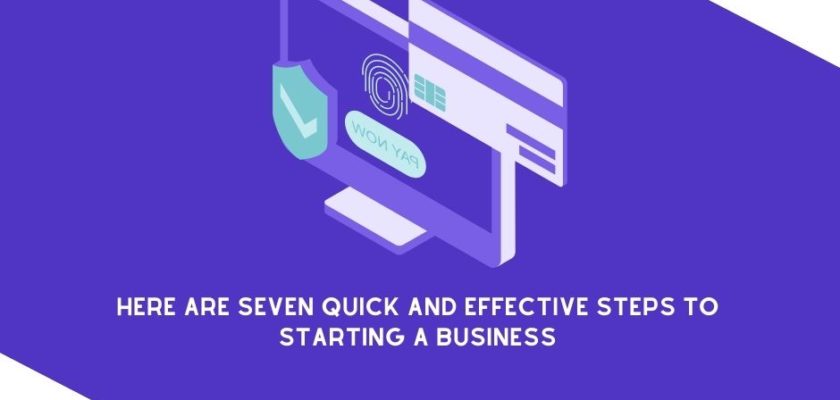More and more people are beginning to realize that American business has changed. Job security is largely a legacy benefit and starting your own business seems far less risky than it once did.
If you’re one of the majority of Americans looking to gain paid self-employment here are our seven key steps to starting your own business without wasting precious time and financial resources.
Make sure entrepreneurship is what you really want
If you’re thinking about starting a business because you’ve lost your job and are having trouble finding a new one then consider doing a better job search. Hire a career coach or get some training. Starting a business is a lot harder than finding a job so it’s worth the extra effort to find it If that’s your real preference get employed in a better way.
Also consider whether you have the following conditions to start a business: No one will tell you what to do (except your customers). As your business goes from start-up to maturity you must have the willingness to be self-motivated willing to make many sacrifices and be able to sustain over the long term.
Decide What Kind of Business You Want
Franchise or Indie? Service or Manufacturing? Brick-and-mortar retail or online? Consumer or business-to-business? There are dozens of different types of businesses each with their own advantages and disadvantages. Like to work with the public? Retail may be right for you but you’ll face There are trade-offs of significant overhead such as rent and utilities.
Want to keep your business small and sell your expertise with low overhead? Being a consultant may be right for you but there are only 24 hours in the day which may limit your income.
Research Your Idea
If you’re thinking about starting a business the most important thing to remember is this: it’s not a race. People in a hurry are punished much more severely in the market than people who don’t take their time. You may hear the term “first mover advantage” – i.e you have a big lead By launching products before everyone else. But the idea is exaggerated especially for small businesses. Show up too early and you risk wasting valuable resources.
It is much better to work methodically and diligently on your ideas. Is anyone else doing it? What is the game like? If consumers and businesses don’t choose your product are there viable alternatives for them? Can your product really solve a pesky problem? Will the demand be great? Enough in the future not just a year or two? Once you’re absolutely convinced you have a better virtual mousetrap then you can move on.
Write a Business Plan
With dozens of business plan resources available online there’s no more excuse for not writing (and not thinking about writing) a business plan before you start your business. Why write a plan even if you’re the only one working in a business? because it forces you to answer criticism If you want to have a great chance of success you can’t ignore problems. It doesn’t have to be very long.
If you don’t have the patience to do more make it a single page. But it should answer these questions:
- What is the purpose of the business?
- Who are my customers?
- What problem does my product/service solve?
- Who are my competitors and why is my product/service advantageous?
- How will I price to position the market and support my product?
- What are my financial projections for the company for the next 3-5 years?
Choose a Business Structure
According to Small Business CPA Michael Hanley the basics of tax planning begin even before your first day in business. Of all the decisions a business owner will make few will have as much impact as physical choice.
Deciding whether to become a sole proprietorship partnership traditional corporation S-Corporation or limited liability company (LLC) will have long-term implications for the future tax implications of your business.
You can read about the benefits and tradeoffs of each plan in many places and there are also excellent concise books on the subject.
Assemble Your Team
While your team is primarily made up of employees think broader. You will need trusted advisors including lawyers tax accountants insurance advisors/agents. You may want to consider hiring a virtual assistant experienced in startups to handle the administrative tasks that come with it conduct business.
Handle the Paperwork
With the advent of entrepreneurship various paperwork requirements cannot be ignored including:
- Apply for the applicable license and registration with the government of your state. Get guidance on which forms you need to fill out from your state’s tax office website.
- If proprietary intellectual property is an important asset to your business you need to protect it now. While filing for trademarks and patents is expensive fighting someone for rights is much more expensive. Also make sure that the internet domain name you get may be Important to your business (at least .com .net and .org and consider .biz and others).
- If you form a minority or women-owned business you may be eligible for special government programs that can provide start-up funding.
- Purchase proper business insurance before starting operations.
Final Thoughts on Entrepreneurship
No matter what type of business you start – selling physical products to provide services contractually building digital products or launching a startup – there will be ups and downs.
When starting a business for yourself it’s important to set realistic expectations so that you don’t get disappointed with your progress after the first few months of growing your customer base.
After you’ve already generated income for your business gain momentum by doing your homework in your industry before quitting your full-time job and launching. Then you’ll be ready to grow from there.
